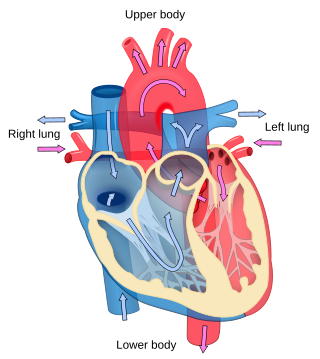
Cardiology is the study of the heart. Cardiology is a branch of medicine that deals with disorders of the heart and the cardiovascular system. The field includes medical diagnosis and treatment of congenital heart defects, coronary artery disease, heart failure, valvular heart disease, and electrophysiology. Physicians who specialize in this field of medicine are called cardiologists, a specialty of internal medicine. Pediatric cardiologists are pediatricians who specialize in cardiology. Physicians who specialize in cardiac surgery are called cardiothoracic surgeons or cardiac surgeons, a specialty of general surgery.

Cardiovascular disease (CVD) is any disease involving the heart or blood vessels. CVDs constitute a class of diseases that includes: coronary artery diseases, heart failure, hypertensive heart disease, rheumatic heart disease, cardiomyopathy, arrhythmia, congenital heart disease, valvular heart disease, carditis, aortic aneurysms, peripheral artery disease, thromboembolic disease, and venous thrombosis.

The American Heart Association (AHA) is a nonprofit organization in the United States that funds cardiovascular medical research, educates consumers on healthy living and fosters appropriate cardiac care in an effort to reduce disability and deaths caused by cardiovascular disease and stroke. They are known for publishing guidelines on cardiovascular disease and prevention, standards on basic life support, advanced cardiac life support (ACLS), pediatric advanced life support (PALS), and in 2014 issued the first guidelines for preventing strokes in women. The American Heart Association is also known for operating a number of highly visible public service campaigns starting in the 1970s, and also operates several fundraising events.

A non-communicable disease (NCD) is a disease that is not transmissible directly from one person to another. NCDs include Parkinson's disease, autoimmune diseases, strokes, heart diseases, cancers, diabetes, chronic kidney disease, osteoarthritis, osteoporosis, Alzheimer's disease, cataracts, and others. NCDs may be chronic or acute. Most are non-infectious, although there are some non-communicable infectious diseases, such as parasitic diseases in which the parasite's life cycle does not include direct host-to-host transmission.
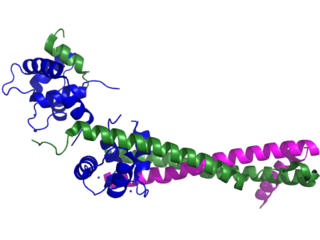
Troponin I is a cardiac and skeletal muscle protein family. It is a part of the troponin protein complex, where it binds to actin in thin myofilaments to hold the actin-tropomyosin complex in place. Troponin I prevents myosin from binding to actin in relaxed muscle. When calcium binds to the troponin C, it causes conformational changes which lead to dislocation of troponin I. Afterwards, tropomyosin leaves the binding site for myosin on actin leading to contraction of muscle. The letter I is given due to its inhibitory character. It is a useful marker in the laboratory diagnosis of heart attack. It occurs in different plasma concentration but the same circumstances as troponin T - either test can be performed for confirmation of cardiac muscle damage and laboratories usually offer one test or the other.

The European Society of Cardiology (ESC) is an independent non-profit, non-governmental professional association that works to advance the prevention, diagnosis and management of diseases of the heart and blood vessels, and improve scientific understanding of the heart and vascular system. This is done by:
HeartScore is a cardiovascular disease risk assessment and management tool developed by the European Society of Cardiology, aimed at supporting clinicians in optimising individual cardiovascular risk reduction.
The World Federation of Hemophilia (WFH) is an international non-profit organization dedicated to improving the lives of people with hemophilia and other genetic bleeding disorders. It educates people with bleeding disorders and lobbies for improved medical treatment. 75% of people in the world with bleeding disorders do not know it and do not receive care.

K. Srinath Reddy is an Indian physician and the Former President of the Public Health Foundation of India and formerly headed the Department of Cardiology at All India Institute of Medical Sciences (AIIMS).

The Indian Heart Association (IHA), along with the Indian Stroke Association (ISA), is an organization dedicated to raising cardiovascular and stroke health awareness among the South Asian population. The organisation was founded by Harvard Medical School and Berkeley-UCSF affiliates Dr. Sevith Rao and Dr. Sishir Rao. The organization has sponsored and conducted cardiac health camps in India to raise awareness about cardiovascular disease and is headquartered in Jubilee Hills, Hyderabad, India.

Soledad Cabezón Ruiz is a Spanish politician for the Spanish Socialist Workers' Party (PSOE) who served as Member of the European Parliament from 2014 until 2019.
The Interamerican Society of Cardiology is a nongovernmental association formed by the National Societies of Cardiology of the American Continent. The Interamerican Society of Cardiology, together with the European Society of Cardiology, founded in 1950, the Asian Pacific Society of Cardiology, founded in 1956, and the African Society of Cardiology founded in 1981 are the four Intercontinental Professional Societies of Cardiology of the World Heart Federation.
Salim Yusuf is an Indian-born Canadian physician, the Marion W. Burke Chair in Cardiovascular Disease at McMaster University Medical School. He is a cardiologist and epidemiologist. Yusuf has criticized the Dietary Guidelines for Americans and disputes the scientific consensus on dietary sodium and saturated fat intake.
Occupational cardiovascular diseases (CVD) are diseases of the heart or blood vessels caused by working conditions, making them a form of occupational illness. These diseases include coronary heart disease, stroke, cardiomyopathy, arrythmia, and heart valve or heart chamber problems. Cardiovascular disease is the leading cause of death in the United States and worldwide. In the United States, cardiovascular diseases account for one out of four deaths. The 6th International Conference on Work Environment and Cardiovascular Diseases found that within the working age population about 10-20% of cardiovascular disease deaths can be attributed to work. Ten workplace stressors and risk factors were estimated to be associated with 120,000 U.S. deaths each year and account for 5-8% of health care costs.

The IACC, a non-profit organisation for non invasive cardiologists, was founded in 2008 by Dr. Rajesh Rajan, 4 Padma Shri doctors, Mohammed Shafiq and five other colleagues from Kerala Institute of Medical Sciences. Based in Kerala, this association works towards the prevention of Cardiovascular Diseases (CVD) and the reduction of cardiovascular mortality in rural India.
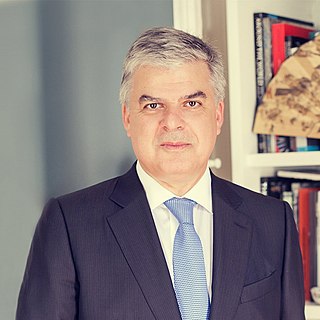
Fausto J. Pinto is a Portuguese academic. He is Professor of Cardiology at Hospital de Santa Maria. Former dean of the Faculty of Medicine at the University of Lisbon.
Cardiovascular disease in women is an integral area of research in the ongoing studies of women's health. Cardiovascular disease (CVD) is an umbrella term for a wide range of diseases affecting the heart and blood vessels, including but not limited to, coronary artery disease, stroke, cardiomyopathy, myocardial infarctions, and aortic aneurysms.

Günter Breithardt is a German physician, cardiologist and emeritus university professor. He is known for his research in the field of rhythmology, especially the diagnosis and pharmacological and non-pharmacological therapy of cardiac arrhythmias and acute cardiac death, in particular the identification of arrhythmia-triggering gene mutations. For 21 years he headed the Medical Clinic and Polyclinic C at Münster University Hospital. A number of his academic students hold university management and chief physician positions.
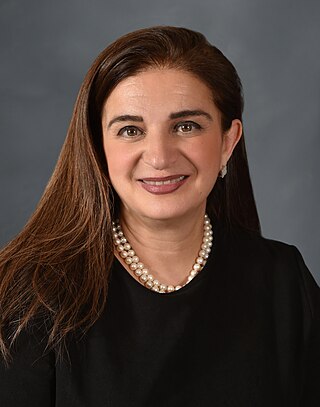
Roxana Mehran is an Iranian-American cardiologist and Mount Sinai Endowed Professor of Medicine at the Icahn School of Medicine at Mount Sinai. She is known for her work in interventional cardiology.
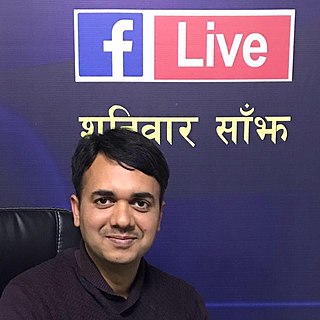
Om Murti Anil MD, FACC is a Nepalese Interventional cardiologist, author and Social media personality. He uses social media to raise health awareness for the prevention of heart disease.













